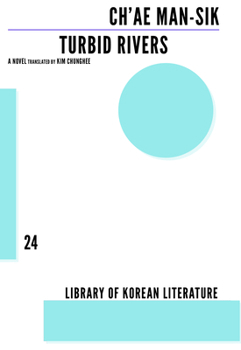Turbid Rivers
(Book #24 in the Library of Korean Literature Series)
Turbid Rivers, the tragic story of a kind-hearted young woman, is both a realistic portrayal of the harsh life in Korea under Japanese rule and a penetrating look into the objectification of women. With biting satire and extreme cynicism, the story depicts the seemingly endless tribulations of the innocent heroine, and the malaise of the early modern period in which people easily became hostage to their own desires. Yet in the novel's subplot, in which two morally upright characters--the heroine's intelligent younger sister and a kindly young doctor--manage to negotiate the turbulent rivers of the time, the author reveals his refusal to despair. He holds on to the faint hope that as long as people maintain their own integrity, and reach out to their suffering neighbors, no matter how limited their ability, life might be livable after all. Although the mildly socialist ideals of the good-hearted doctor in the end prove to be no real cure for the prevalent evils of the times, they serve as a guiding light toward establishing a livable society.





